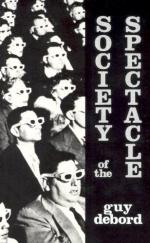
|
| Name: _________________________ | Period: ___________________ |
This test consists of 15 multiple choice questions and 5 short answer questions.
Multiple Choice Questions
1. What does Ruge doubt he will see in his lifetime?
(a) Society of the spectacle.
(b) Bourgeoisie power.
(c) Production equlity.
(d) Political revolution.
2. Who is representative of a person leaving cyclical time in Chapter 5?
(a) Royalty.
(b) Pilgrim.
(c) Bourgeoisie.
(d) Proletariat.
3. What are the temples of frenetic consumption in Chapter 7?
(a) Governments.
(b) Shopping centers.
(c) Churches.
(d) Schools.
4. Production time is time ______ in Chapter 6.
(a) Valued.
(b) Qualified.
(c) Devalued.
(d) Quantified.
5. What does Debord believe is the star commodity in the society of the spectacle?
(a) Culture.
(b) Freedom.
(c) Media.
(d) Technology.
6. The goal of communism, as stated in Chapter 6, is to do what to everything that exists independently of individuals?
(a) Synthesize.
(b) Abolish.
(c) Embrace.
(d) Ignore.
7. What era does Debord believe de-sanctified power?
(a) Roman.
(b) Middle Ages.
(c) Ancient Greece.
(d) Renaissance.
8. Which philosopher is referred to in thesis 206?
(a) Kierkegaard.
(b) Plato.
(c) Voltaire.
(d) Socrates.
9. In thesis 173, who is architecture now being specifically created for?
(a) Royalty.
(b) Governments.
(c) The ruling class.
(d) The poor.
10. Where was universal history born, according to Chapter 7?
(a) In cities.
(b) In kingdoms.
(c) In dark corners.
(d) In countries.
11. The unification of culture has led to the demise of art and _________ in Chapter 8.
(a) Freedom.
(b) History.
(c) Knowledge.
(d) Language.
12. In the world of advertising, it is forbidden to do what?
(a) Get old.
(b) Fail.
(c) Be young.
(d) Succeed.
13. What does urbanism institute as it destroys the cities in Chapter 7?
(a) Pseudo-wealth.
(b) Pseudo-countryside.
(c) Pseudo-cities.
(d) Pseudo-culture.
14. What kind of alienation does Debord believe the spectacle specializes in?
(a) Self.
(b) Spatial.
(c) Linear.
(d) Total.
15. According to Debord, urbanization is __________.
(a) Tourism.
(b) Freedom.
(c) Alienation.
(d) Leisure.
Short Answer Questions
1. Culture is defined as what in Chapter 8?
2. What is strictly a secondary consideration of time by the modern production system in Chapter 6?
3. What is modern society's obsession with time, as described in Chapter 6?
4. What is the product of the leisure of localizations in Chapter 7?
5. What does thesis 207 say is necessary for the progress of ideas?
|
This section contains 315 words (approx. 2 pages at 300 words per page) |

|




